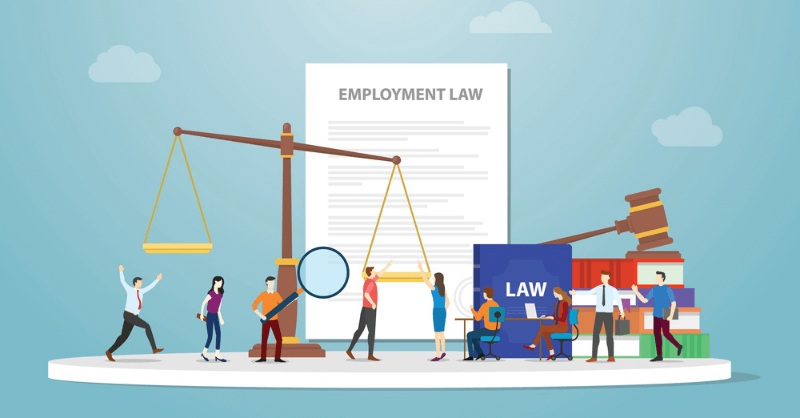
Employment law is a critical area that governs the relationship between employers and employees, ensuring that both parties adhere to their rights and responsibilities. Understanding your rights as an employee is essential for fostering a fair and equitable workplace. Whether you are a seasoned professional or just starting your career, being aware of your legal protections can empower you to advocate for yourself effectively. This blog section delves into the fundamental aspects of employment law, highlighting your rights and the avenues available for recourse if those rights are violated.
The Foundation of Employee Rights
At the core of employment law is the principle that employees have certain rights that must be respected by their employers. These rights encompass a wide range of issues, including wages, working conditions, and protection against discrimination. The Fair Labor Standards Act (FLSA) is one of the key pieces of legislation that establishes minimum wage, overtime pay, and child labor standards. Under the FLSA, employees are entitled to receive at least the federal minimum wage, and they must be compensated for overtime work at a rate of one and a half times their regular pay. Understanding these provisions is crucial, as they form the foundation of your rights regarding compensation.
Additionally, employees are protected against workplace discrimination under various federal laws, such as Title VII of the Civil Rights Act, the Americans with Disabilities Act (ADA), and the Age Discrimination in Employment Act (ADEA). These laws prohibit discrimination based on race, color, religion, sex, national origin, disability, and age. Employees have the right to work in an environment free from harassment and discrimination, and they can file complaints with the Equal Employment Opportunity Commission (EEOC) if they believe their rights have been violated. Familiarizing yourself with these protections can help you recognize when your rights are being infringed upon.
The Importance of Workplace Safety
Another critical aspect of employment law is occupational safety and health. The Occupational Safety and Health Administration (OSHA) sets and enforces standards to ensure safe and healthful working conditions for employees. Under OSHA regulations, employees have the right to work in environments that are free from serious hazards. Employers are required to provide necessary safety equipment, conduct regular safety training, and maintain a workplace that complies with safety standards. If you believe your workplace poses a risk to your health or safety, you have the right to report unsafe conditions without fear of retaliation.
Moreover, employees are entitled to the right to participate in workplace safety programs and to refuse unsafe work under certain conditions. This means that if you are asked to perform a task that you reasonably believe poses an imminent danger to your health or safety, you can refuse to do so without facing disciplinary action. Understanding these rights is vital, as they not only protect your well-being but also contribute to a culture of safety within the workplace.
Family and Medical Leave Rights
In addition to workplace safety, employees have rights related to family and medical leave. The Family and Medical Leave Act (FMLA) allows eligible employees to take unpaid, job-protected leave for specific family and medical reasons, such as the birth of a child, adoption, or a serious health condition. Under the FMLA, employees are entitled to up to 12 weeks of leave in a 12-month period without the risk of losing their job or health benefits. It is essential for employees to understand their eligibility for FMLA leave and the procedures for requesting it, as failure to follow proper protocols can lead to complications in securing this important benefit.
Employers are required to inform employees of their rights under the FMLA, including the process for applying for leave and any necessary documentation. Understanding these rights can help you navigate personal or family health challenges while minimizing the impact on your employment. If you believe your FMLA rights have been violated, you have the option to file a complaint with the Department of Labor or pursue legal action against your employer.
Addressing Workplace Grievances
Despite the protections afforded by employment law, disputes between employees and employers can arise. Understanding how to address workplace grievances is essential for protecting your rights. Most employers have established procedures for reporting complaints, whether related to discrimination, harassment, or unsafe working conditions. It is advisable to familiarize yourself with your employer's grievance policy and follow the appropriate channels to report any issues. Documentation is crucial in these situations; keeping detailed records of incidents, communications, and any relevant evidence can strengthen your case.
If internal resolution efforts fail, employees may seek assistance from external agencies. Organizations such as the EEOC, OSHA, or state labor departments can provide guidance and support in filing formal complaints. In some cases, employees may also choose to consult with an employment attorney to explore their legal options. Understanding the steps to take when facing workplace issues can empower you to protect your rights effectively and seek justice when necessary.
Conclusion: Empowering Yourself Through Knowledge
In conclusion, understanding your rights as an employee is crucial for navigating the complexities of the workplace. Employment law is designed to protect you from unfair treatment, discrimination, and unsafe working conditions. By familiarizing yourself with the foundational principles of employment law, including wage rights, workplace safety, family leave, and grievance procedures, you can empower yourself to advocate for your rights effectively. Remember, knowledge is your best ally in ensuring a fair and equitable work environment. If you ever find yourself in a situation where your rights are being violated, do not hesitate to seek help and take action. Your rights as an employee are not just legal protections; they are essential components of a healthy and productive workplace.
